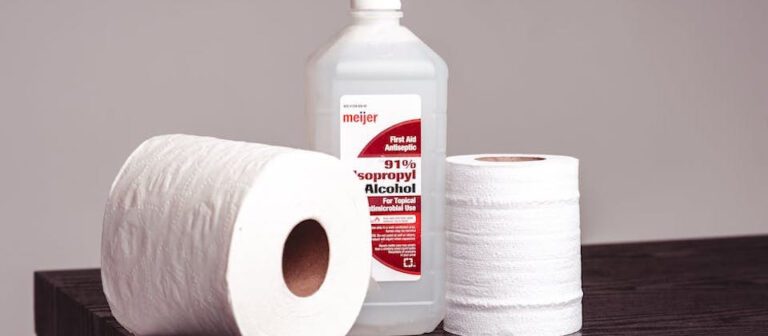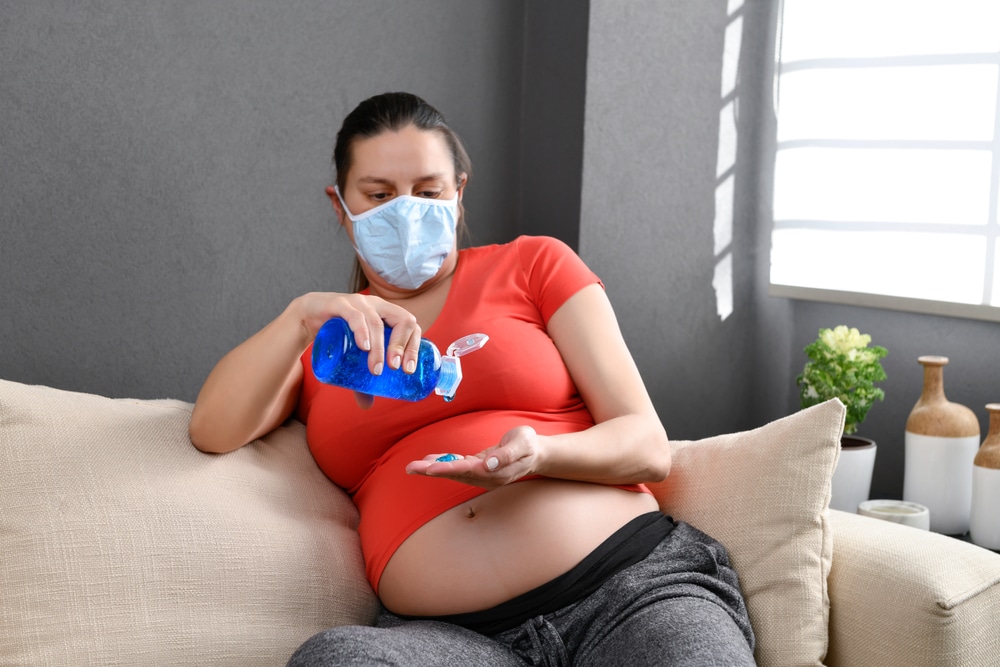“Smelling rubbing alcohol for nausea” might sound odd, but many people swear by this quick fix. Inhaling the vapors of a simple alcohol swab can sometimes relieve that feeling of nausea in seconds. Whether you’re battling post-motion sickness, food poisoning, or the infamous morning sickness during pregnancy, learning about this technique could be helpful.
But rubbing alcohol also increases the risk of preterm labor and SIDS. If you are pregnant and suffer from nausea or vomiting, you should speak with your doctor before using any remedy. Although the Centers for Disease Control and Prevention do not recommend rubbing alcohol during any stage of pregnancy, many mothers-to-be still use it as a form of self-medication.
Read on to discover how it works, safety considerations, including for pregnant women, and natural alternatives to keep you feeling your best.
What Is Smelling Rubbing Alcohol for Nausea?

Smelling rubbing alcohol refers to briefly inhaling the vapors of isopropyl alcohol (IPA), usually by holding a 70% IPA-soaked alcohol swab or a small bottle of isopropyl alcohol for nausea relief a few inches from your nose and taking a few gentle sniffs.
Unlike ingesting remedies or over-the-counter nausea medicine while pregnant, this method relies solely on inhaling vapors of IPA, where it is rapidly absorbed into the bloodstream and exerts central effects. It’s often used in emergency departments as an instant, low-cost antiemetic.
How It Works: Why Does Smelling Rubbing Alcohol Help With Nausea?
-
Olfactory Distraction
The strong scent of isopropyl alcohol floods your olfactory nerves, temporarily overriding the unpleasant signals that tell your brain you feel sick. -
CNS Modulation
Small amounts of inhaled alcohol can have a mild depressant effect on the central nervous system. This may blunt the visceral signals that trigger vomiting. -
Parasympathetic Boost
Some experts believe the quick inhalation can shift your autonomic balance toward a calmer, parasympathetic state, easing nausea.
Is it normal to crave smells during pregnancy?
It’s not unusual for pregnant women to crave certain smells like rubbing alcohol or gasoline. This may be due to a higher level of hormones in the body which is entirely normal. Try to find things that make you happy, and don’t overdo it with the rubbing alcohol smells, as this could lead to negative consequences like an addiction.

You May Have Desiderosmia
Desiderosmia during pregnancy is a craving for alcohol that women may experience. This craving can range from mild to severe and may last throughout the pregnancy. Mild desiderosmia may only require occasional drinking, whereas more severe cases may require drinking regularly.
Pregnant women should avoid excessive drinking, as it can harm both the mother and the baby. If you are experiencing desiderosmia during pregnancy, speak with your doctor about possible treatments.
What is pica during pregnancy?
Pica is another condition that can affect pregnant women. It occurs when a person has an intense craving for items that are generally not eaten, such as dirt, chalk, paint, starch, etc. This craving can be so fierce that the person will eat or drink something that is not usually considered food or drink. Pica during pregnancy can lead to nutritional deficiencies and even fetal harm.
Smelling Rubbing Alcohol for Nausea During Pregnancy
Is It Safe? Morning Sickness Remedies Compared
When you’re pregnant, your body becomes exquisitely sensitive to smells, and that’s exactly why “smelling rubbing alcohol for nausea during pregnancy” becomes a tempting trick for quick relief. However, as appealing as that sharp, clean scent might be, there are important reasons to proceed with caution.
Benefits and Risks

Quick Relief in Non-Pregnant Adults
In non-pregnant settings, like postoperative nausea or rubbing alcohol nausea after chemotherapy, studies have shown that simply sniffing alcohol for nausea can reduce queasiness within a minute or two. Many emergency departments now keep alcohol swabs at the bedside for this reason.
Risks of Using Isopropyl Alcohol For Nausea
-
Lack of Pregnancy-Specific Research
While small studies in nonpregnant adults show inhaled isopropyl alcohol can blunt queasiness, no clinical trials have tested its safety for expectant mothers or developing babies. -
Potential for Overexposure
Repeated or prolonged sniffing may lead to dizziness, headache, or even light respiratory irritation, effects you don’t want when you’re already juggling morning sickness, fatigue, and changing blood pressure. -
Placental Transfer
IPA vapors are absorbed through your lungs and converted in the liver to acetone, a compound known to cross the placenta in animal studies. Although typical inhalation doses are low, the exact fetal exposure remains unknown. -
CNS Effects
High concentrations of inhaled alcohol can depress the central nervous system. In theory, this could affect maternal blood pressure or breathing, both critical for steady oxygen delivery to your baby. -
Respiratory Irritation
Pregnancy can already leave you more prone to sinus congestion and mild bronchospasm. Inhaling strong solvents may exacerbate these issues. -
Acute Side Effects
Headache, dizziness, and unpleasant taste have been reported, but serious adverse events are rare at typical inhalation doses. -
Dermal/Ocular
Skin dryness, irritation; eye irritation if vapors contact mucosa.
-
Flammability Hazard
Fire hazard near open flames or sparks
Home Remedies for Morning Sickness instead of Smelling Rubbing alcohol
When you’d rather skip the rubbing alcohol swabs, there are plenty of natural ways to treat nausea that are safe and effective for expectant moms. Below, you’ll find tried-and-true home remedies for morning sickness to give you fast pregnancy nausea relief.

1. Ginger for Nausea
Ginger Ale: Pregnant woman should drink ginger ale. Choose a brand made with real ginger (not just flavoring). Sip slowly over 15–20 minutes at the first twinge of queasiness.
Fresh Ginger Tea: Slice a few thin pieces of fresh root, steep in hot water for 5 minutes, then add a squeeze of lemon and a teaspoon of honey. This combination soothes the stomach lining.
Ginger candies or pregnancy candies with ginger extract can be popped throughout the day for ongoing relief.
2. Herbs and “Sips”
Herbs for Nausea: Chamomile and peppermint are gentle digestive aids. Brew as a mild tea and let it cool slightly before sipping.
Sprite or 7 Up: A small glass of clear, carbonated soda can help “settle” upset stomachs. Let the bubbles work their magic; just don’t overdo it on sugar.
Lemon Water: A few slices of lemon along with mint in a tall glass of ice water provide both hydration and a refreshing citrus scent that can reset your nausea sensors.
3. Small, Frequent Nourishment
Plain Crackers or Toast: Keep simple carbohydrates at your bedside and nibble a few before you even get out of bed.
Nausea Candy for Pregnant Women: Non-medicated lozenges made with real ginger or peppermint oil can be a discreet, on-the-go fix.
4. Acupressure and Movement
Pressure Point Bands: Wristbands that press on the P6 point (Neiguan) are an easy, drug-free approach.
Gentle Walks: Light activity, especially in fresh air, helps digestion and reduces nausea triggers.
5. Supplements & OTC Options
Vitamin B₆: A first-line supplement that can cut nausea by up to 50%. Typical dosing is 10–25 mg, three times daily.
Over-the-Counter Nausea Medicine While Pregnant: After speaking with your OB/GYN, you may add doxylamine (often combined with B₆) or antihistamines like meclizine for breakthrough symptom control.
Until more data exists, experts advise focusing on proven pregnancy nausea relief steps rather than relying on rubbing alcohol fumes.
Comparing Isopropyl Alcohol vs Rubbing Alcohol and Alternatives
When exploring the topic of smelling rubbing alcohol for nausea, it’s important to understand the difference between isopropyl alcohol and rubbing alcohol, as they are often used interchangeably but may have slight variations in their composition and effectiveness. If you’re considering using rubbing alcohol for nausea relief, especially during pregnancy or while looking for natural alternatives, this distinction matters.
Isopropyl Alcohol vs Rubbing Alcohol
-
Isopropyl Alcohol is the active ingredient (usually 70–90%).
-
Rubbing Alcohol may include water and denaturants (denatured ethanol).
Both deliver similar vapors for nausea relief, but pure isopropyl tends to be more consistent in concentration.
However, if you’re considering using alcohol vapors to alleviate nausea, particularly during pregnancy, it’s essential to weigh these options carefully, especially since safety concerns regarding smelling rubbing alcohol for nausea during pregnancy exist, as we discussed earlier in the blog.
Some people also ask, does the smell of nail polish remover help with nausea? Nail polish remover often contains acetone, which has a harsher scent and stronger CNS effects. It’s not recommended.
How Long to Sniff Alcohol for Nausea and Best Practices
If you still choose to use rubbing alcohol for nausea because it just simply helps you, follow the guideline below:
-
-
Hold the swab about 2–3 inches from your nose.
-
Take 2–3 gentle sniffs (don’t inhale deeply).
-
Wait 30 seconds to assess relief.
-
Repeat once or twice if needed. Avoid continuous sniffing for more than a minute at a time.
-
By limiting exposure to short bursts, you minimize dizziness and irritation. Always keep the area well ventilated.
Can I Get Addicted to Smelling Rubbing Alcohol?
While it’s rare, some people may develop a compulsion to smell rubbing alcohol, especially if it provides quick relief from nausea. This could be due to the immediate calming effect the scent has or the association with feeling better.
Why It Happens:
-
- People addicted to smell of rubbing alcohol may find that the smell of the substance is pleasurable and can become an addiction in and of itself.
- The smell of rubbing alcohol can be addictive because it mimics the scent of drugs or other substances associated with pleasure or addiction.
- Some people who are addicted to smell of rubbing alcohol may damage their nasal passages due to their addiction, which can make breathing difficult and increase the risk for other respiratory problems.
- Rubbing alcohol can also cause dehydration, which can lead to nausea, vomiting, and headaches.
- People addicted to rubbing alcohol may also become involved in criminal activities to get more rubbing alcohol or money to support their habit.
FAQ’s
1. Is smelling rubbing alcohol terrible during pregnancy?
Many people believe that smelling rubbing alcohol is bad for pregnant women, but the truth is that there is no concrete evidence to back up this claim. Some research suggests that rubbing alcohol may harm a developing fetus, but other studies have not found any conclusive proof linking the smell of rubbing alcohol with adverse health outcomes.
2. What does sniffing alcohol do to you?
When you sniff alcohol, the rubbing alcohol molecules are absorbed through your nasal passages into your bloodstream. The rubbing alcohol breaks down into acetaldehyde and ethanol. Together, they create a toxic mix known as ethyl acetate. Ethyl acetate can cause nausea, vomiting, and dizziness. It can also lead to rapid breathing, heart rate changes, coma, and even death.
3. What about smelling rubbing alcohol for nausea while pregnant?
When pregnant, many women choose to use rubbing alcohol as a way to ease nausea. However, some scientists are beginning to question this practice. Rubbing alcohol can potentially harm the baby if it is ingested. Rubbing alcohol may also irritate the stomach and worsen nausea. If you consider using rubbing alcohol to relieve your nausea during pregnancy, you must speak with your doctor first.
4. Can I smell hand sanitizer while pregnant?
It has been debated for years whether or not smelling hand sanitizer is safe to do while pregnant. Recent research has shown that hand sanitizer compounds can harm the mother and baby. While there are no definitive answers as to whether or not it is safe to smell hand sanitizer while pregnant, it is probably best to err on the side of caution and avoid doing so.
5. Can you use rubbing alcohol on skin while pregnant?
It’s generally safe to use rubbing alcohol on the skin during pregnancy in small amounts, but avoid prolonged exposure or inhalation of fumes.
6. Does smelling alcohol help with headaches?
Smelling alcohol, like rubbing alcohol, may temporarily relieve some headache symptoms due to its strong scent, but it is not a long-term solution.
Final Thoughts
Smelling rubbing alcohol for nausea is a quick, low-cost trick that works for many adults outside of pregnancy. However, during pregnancy, stick with morning sickness remedies endorsed by your healthcare provider, like vitamin B₆, ginger, and dietary changes, until more studies confirm the safety of inhaled isopropyl alcohol.








